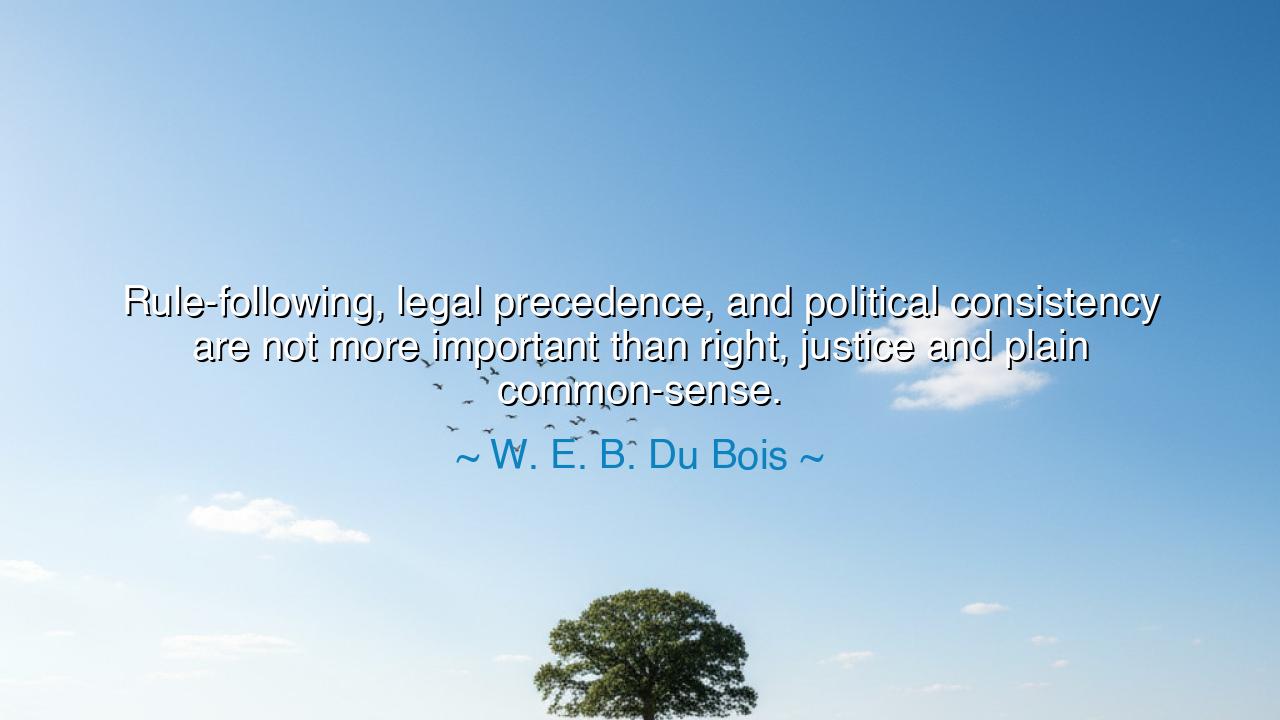
Rule-following, legal precedence, and political consistency are
Rule-following, legal precedence, and political consistency are not more important than right, justice and plain common-sense.






Hear the fierce and unyielding words of W. E. B. Du Bois, a prophet of justice in an age of oppression: “Rule-following, legal precedence, and political consistency are not more important than right, justice and plain common-sense.” In these words, he pierces the veil of formality that so often cloaks injustice. He reminds us that the law, though cloaked in ceremony and precedent, is but a tool; and when the tool is twisted against truth, it must be cast aside for the higher calling of righteousness.
At the heart of his declaration lies the eternal struggle between law and justice. Law is written by men, bound in statutes, argued in courts, and preserved through precedent. Yet justice flows from deeper springs: from conscience, from morality, from the universal truths that recognize the dignity of every soul. Du Bois, who saw the crushing weight of Jim Crow and the betrayal of Black freedom after Reconstruction, understood that to cling blindly to precedent was to sanctify oppression. The highest duty, he insisted, was not to follow rules, but to pursue right and common-sense, even when precedent commanded otherwise.
History thunders with examples of this truth. Consider the infamous ruling of Plessy v. Ferguson in 1896, where the Supreme Court, bowing to precedent and political consistency, declared segregation lawful under the guise of “separate but equal.” For decades, this rule-following shackled generations of African Americans, denying them equality while pretending to honor law. It was not until 1954, in Brown v. Board of Education, that the court at last shattered this false idol of precedent, recognizing that justice demanded equality, not segregation. Du Bois’s words echo here: justice must rise above the comfortable prison of legal tradition.
The wisdom of Du Bois is also profoundly practical. Common-sense—that simple recognition of fairness, of truth visible to all—should never be sacrificed to the convolutions of political maneuver or legal jargon. What sense is there in laws that protect privilege but deny humanity? What sense is there in politics that prizes consistency over compassion? Du Bois calls us to remember that law without justice is tyranny, and politics without morality is corruption.
His own life bore witness to this creed. As a founder of the NAACP, Du Bois waged battle not by blind adherence to rules but by challenging them, bending the arc of history toward justice. He wrote, he spoke, he organized, always with the conviction that no structure of law or politics could stand unchallenged if it opposed the higher truth of human dignity. His courage teaches that one must sometimes break with tradition to honor the eternal principles of right.
The lesson for us is clear: never mistake legality for morality. What is legal may be cruel; what is consistent may be unjust. True wisdom lies in discerning when rules must be upheld and when they must be cast down in the name of justice. This requires courage, for to defy precedent is to face resistance. Yet without such courage, the world would remain bound to the injustices of the past.
Therefore, children of tomorrow, engrave these words upon your hearts: justice is higher than law, truth stronger than tradition, and common-sense more enduring than political schemes. Do not follow rules blindly, but weigh them against the scales of righteousness. Do not bow to precedent when it sanctifies cruelty. Stand firm, as Du Bois did, in the conviction that humanity’s highest calling is not obedience, but justice. And let your actions, guided by this principle, bend the world ever closer to the light.






AAdministratorAdministrator
Welcome, honored guests. Please leave a comment, we will respond soon